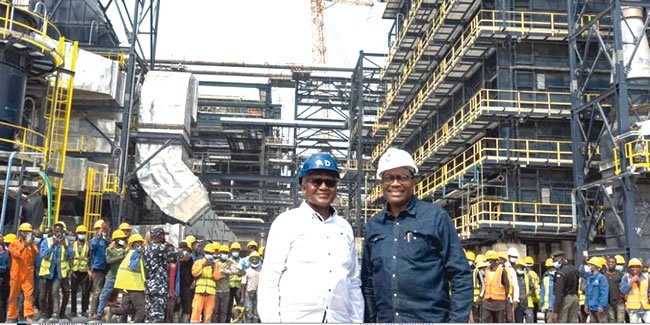The announcement on the removal of petrol subsidy by President Bola Tinubu was greeted with mixed reactions from various stakeholders. In the midst of this is the hope that the newly inaugurated Dangote Refinery will bring succour. ADETOLA BADEMOSI writes on this likelihood.
On May 29, President Bola Tinubu, in his inaugural address declared with emphasis the removal of subsidy on the Premium Motor Spirit (PMS) alternatively known as petrol.
The pronouncement was welcomed with knocks and commendations from various stakeholders. While some see the development as belated, others feel otherwise.
Fuel subsidies are a form of government intervention to reduce the cost of fuel by providing direct financial support to oil companies, and as such, subsidise the cost to consumers.
That said, pricing of petroleum products has remained a significant issue in Nigeria. The government had, in the 1970s, introduced subsidy as a temporary measure to provide relief to Nigerians over the high cost of petroleum products.
According to reports, the high cost of petroleum products at that time was partly due to the poor performance of the then Nigerian National Petroleum Corporation (NNPC) refineries and the need for importation of refined products to ensure petroleum products availability in the country.
However, these subsidies have become increasingly unsustainable in recent years and this has crippled economic development.
NNPC, being the supplier of last resort, had over the years, adopted various products importation agreements such as Direct Product Importation, Off-shore Processing Arrangements (OPA), Exchange of Crude Oil for Products Arrangement (SWAP) and the Direct Sale, Direct Purchase (DSDP) arrangement.
According to Nigerian Extractive Industry Transparency Initiative (NEITI), oil and gas industry audits revealed that between 2006 and 2019, a total sum of N7 trillion was expended on petroleum subsidy.
Only recently, the Nigerian National Petroleum Company Limited (NNPCL) announced that the FG still owes it a sum of N2.8 trillion subsidy payments with over N400 billion required monthly to subsidise PMS.
In the midst of these controversies, there were also assurances that predicted better times in the near future.
Dynamics of subsidy
Abiola Soremekun, an oil and gas expert, said although fuel subsidies have been beneficial in terms of making petroleum more accessible to citizens, they have also had some negative impacts on the economy.
“For one, they have led to increased corruption and mismanagement due to weak oversight mechanisms, with some individuals and companies taking advantage of the system to make illegal profits.
“In addition, the government spends a significant amount of money on petroleum subsidies, leading to increased public debt. In some cases, the cost of subsidies can exceed the revenue earned from the sale of crude oil, Nigeria’s main export,” he said.
He also said due to the price differences between Nigeria and neighbouring countries and the inefficiencies in the distribution and supply chain, petroleum products are often smuggled out of the country, leading to frequent shortages and long queues at petrol stations.
“Finally, subsidy prices encouraged the overconsumption of petroleum products, leading to increased air pollution and greenhouse gas emissions, discouraging investment in the domestic refining industry and alternative energy sources.
“Given these issues associated with fuel subsidy programmes, it is clear that there needs to be a comprehensive reform effort aimed at addressing them if Nigeria is going to achieve sustainable development through petroleum-generated revenue,” he noted.
Dangote Refinery
A week before Tinubu’s subsidy removal pronouncement, former President Muhammadu Buhari inaugurated the 650,000 barrels per day Dangote Refinery located in Lagos.
In 2013, Nigerian businessman, Aliko Dangote, announced plans to commence the $15billion project, an integrated refinery and petrochemical venture expected to produce enough to meet local demand plus a surplus for export.
No doubt, with the recent removal of subsidy which sent petrol pump prices to over 200 percent increase, Nigerians amongst other stakeholders are waiting to see how the new refinery will help to bring about a reduction in pump price.
Expectedly, Nigerians are groaning as transportation fares have since tripled while private motorists have also complained about the cost of fuelling their tanks.
Most importantly, it is widely believed that when the refinery comes on stream, it will ease forex demand along with the expected reduction in the pump price of PMS.
In one of her visits to the refinery, former Minister for Finance, Budget and National Planning, Mrs Zainab Ahmed, stated that the country would save about $10billion of foreign exchange once the project is completed.
“And for us in government, that is a saving of at least $10bn that will be sitting in our reserves instead of flying out to pay for petroleum products,” she said.
Dangote refinery a recourse?
An average Nigerian assumes that the Dangote Refinery project is likely to reduce petrol pump price but factors like freight, tax, demurrage, landing cost, Jetty-Depot through-put among others contribute to pricing.
But if such money-gulping factors are eliminated, one could predict a reduction
The Chief Executive (ACE), Nigerian Midstream and Downstream Petroleum Regulatory Authority (NMDPRA), Farouk Ahmed, recently explained that the refinery would give Nigeria easy access to petroleum products on-land for security reasons while also increasing professional employment.
However, he was quick to caution against optimism for cheap petroleum products, saying, “I don’t think products will be cheaper because the company will be buying crude oil at the international price.”
But he noted that: “It is going to be cheaper in terms of freight rate that is, bringing cargoes from Europe. Dangote Refinery is a game changer in terms of accessibility.
“By the time the NNPC refineries and other modular refineries across the country come on stream, Nigeria will be a net exporter of petroleum products.
“By refining this product here in Nigeria, all those costs associated with either demurrage from import, costs associated with freight will be totally eliminated,” said the CBN Governor, Godwin Emefiele.
A Professor of Economics at the University of Ibadan and an energy expert, Professor Adeola Adenikinju, also shared similar position while speaking with the Nigerian Tribune.
Still, he opined that the likelihood in reduction of petrol pump price may be dependent on the agreement between Dangote and the Federal Government.
“It is likely to reduce the cost of fuel pump price. I said likely because I don’t know the terms or conditions with which we are going to buy. Look at cement; the price (in Nigeria) is one of the highest in the world and yet it is produced locally by Dangote,” said Adenikinju.
“But some of the other costs like freight, tax, transportation and insurance that are associated with the price will not be there again. Overall this is a win-win situation if it works well. Nigeria should benefit from the refinery.”
Bala Zakka, an energy expert, on his part, said currently, the pricing mechanism to be adopted by Dangote is still unknown. He however noted that refining in Nigeria would reduce petrol pump price.
His words: “Refining is going to be done in Nigeria. He will buy the crude oil within Nigeria and the crude oil will be moved from the well-heads to his refinery within Nigeria. The price of petrol from Dangote Refinery will be cheaper than what is imported from refineries abroad.
“Reason is that if the refinery is abroad and you are bringing the products from there, you are going to pay for the vessel, cost of transportation, insurance, and security. When the vessel gets to Nigeria, if there is no space to anchor, you are also going to pay while waiting to discharge them. And when you come and there is no place to discharge them and keep, you have to look for private depot and keep the products. All these charges will add to the overall cost per litre.”
Credit: Tribune Newspaper








